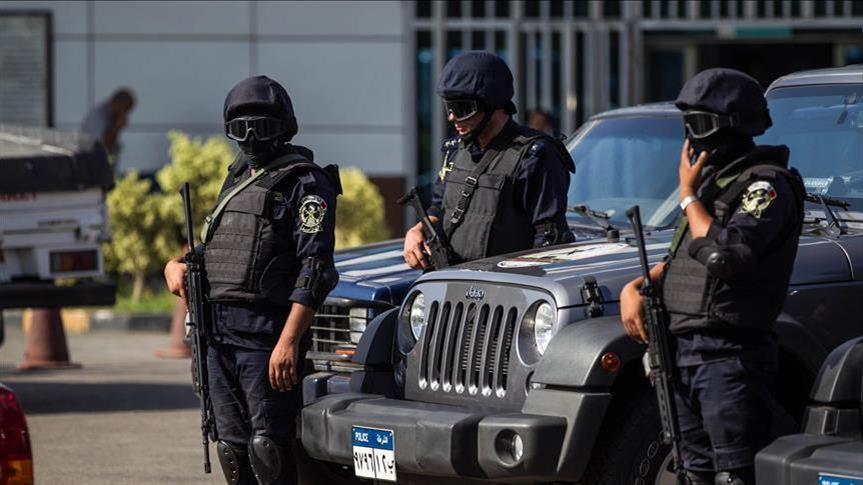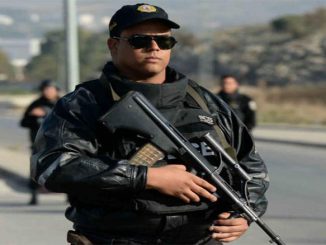
The Islamic Sate(ISIS)has claimed responsibility for an attack at a Cairo church that left at least nine people dead.The claim, which was carried by the group’s Aamaq news agency, said Friday’s attack was carried out by a “security detail” and that one of its men was “martyred” in it.
In the latest attack targeting the country’s Christian minority, a gunman on a motorcycle opened fire outside the church and at a nearby store, sparking a shootout that killed at least nine people, including eight Coptic Christians,
The gunman was also killed, along with at least one police officer, officials said.
Egypt’s Coptic Christians have been specifically targeted by the militants, who carried out a series of bombings against churches starting in December 2016, killing more than 100 and wounding scores.
The local ISIS affiliate has claimed responsibility for all the bombings targeting Christians.
On Saturday, video clips circulating on social media pictured the gunmen who opened fire outside an Egyptian church and a nearby store owned by a Copt in an attack that killed at least nine people walking armed and unchallenged on a residential street for nearly 10 minutes.
The the videos showed the gunman stops only occasionally to shoot at his pursuers before he is himself shot.
In fact, the sight of the gunman’s calm just minutes after Friday’s attack contradicted with the self-congratulation pro-government media reveled in on Saturday.
The pro-government media focused their coverage on how police “successfully” prevented the Islamic State militant from breaking into the church and detonating an explosive device said to have been found on him.
The videos drew a flood of critical comments about the police’s handling of the shooting, with many of them ridiculing the lavish praise heaped on police.
Friday’s attack came amid hightened security around churches and other Christian facilities in anticipation of violence on New Year’s Eve and the January 7 Christmas of the Coptic Orthodox Church, by far Egypt’s largest Christian denomination.
It’s the latest terrorist attack in the series of a long running war between ISIS-led militants and the security forces that has been mostly taking place in the Sinai Peninsula.
During the last month, Egypt witnessed one of its deadliest-ever terrorist attacks in its modern history. Over than 300 people were killed and several hundred injured by a gang of militants inside the Rawdah mosque in Bir-Al-Abed in northern Sinai.
However the Islamic State did not claim responsibility for that attack.
In the same context, militants fired a guided missile on the airport in el-Arish, northern Sinai’s largest city on the Mediterranean last week.
The missile destroyed a helicopter and killed at least one senior officer.
Significantly, the attack took place while the defense and interior ministers were present on an unannounced visit. Both escaped unharmed, but the attack indicated an unusually high level of actionable intelligence available to the militants.
Moreover, 54 security forces members were ambushed 135 km south west of Cairo last October, a clear sign of a failing counterinsurgency policy.
There is no doubt that Egypt’s security policies are questionable with the rising number of terrorist attacks that hit the country recently.
Despite al-Sisi’s repeated promises to fight terrorism, it seems how his policies have failed until now to achieve its goals.
North Sinai has been the site of an ongoing insurgency by jihadists since 2013.
Sinai Province group – first emerged in 2011, and was previously known as Ansar Beit al-Maqdis- has pledged allegiance to ISIS after the declaration of their so-called caliphate across Syria and Iraq in 2014.
The militant group was responsible for weekly attacks on the army and police in Sinai. It has also claimed responsibility for dozens of attacks, including the 2015 bomb abroad a Metro Jet flight which killed 224 people, many of them Russian tourists.
In the four years since al-Sisi led the military coup in 2013 against the country’s first democratically elected president Mohamed Morsi, Egypt’s state security has stepped up its surveillance activities and maintains a high-profile presence throughout the country.
Alongside an army of plainclothes agents, video cameras are mandatory inside cafes and businesses in many parts of Cairo. Access to many online news sites has been blocked and social media is widely believed to be under surveillance.
The state is doubling down on all political opposition — democracy activists, Islamists, and supporters of Mohamed Morsi.
And yet, in what is seen as a troubling paradox, the country’s massive security apparatus failed to prevent the carrying out of the latest terrorist attacks.



